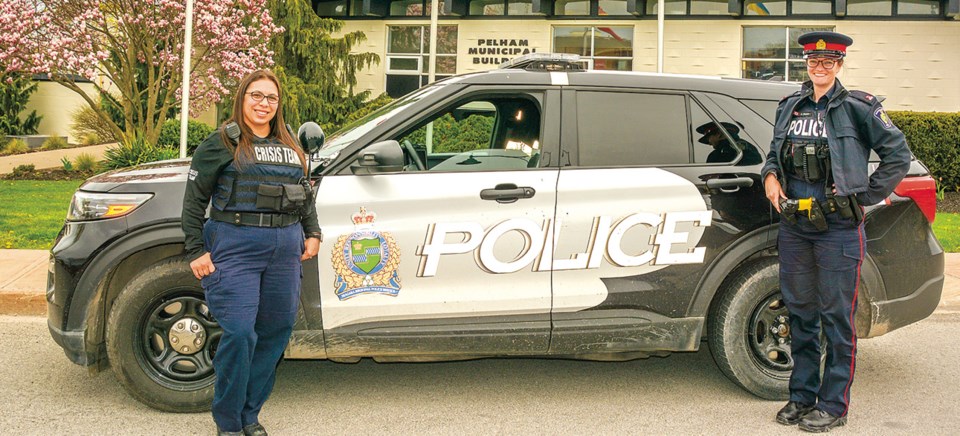Pilot program offered jointly by NRPS and Canadian Mental Health Association
Throughout the Covid-19 pandemic, local politicians, social activists, and health organizations have warned that our communities are suffering through an escalating mental health and addictions crisis, which affects not just the afflicted, but our hospitals, police, health-providing agencies, and court system.
Of particular concern is the volume of 9-1-1 calls received for people in distress.
A successful crisis-response program is now in place in Niagara, a partnership between the Niagara branch of the Canadian Mental Health Association (CMHA) and the Niagara Regional Police Service (NRPS). Working together, they have drawn on statistical analysis of police calls for service in relation to people in crisis and mental health-related incidents throughout the Region, and implemented teams to de-escalate crisis situations, and immediately assess individuals’ mental health and addiction care needs.
The Mobile Crisis Rapid Response Team (MCRRT) program was activated in 2015 in St. Catharines and Thorold, followed by Niagara Falls and Niagara-on-the-Lake in 2021. The teams consist of a full-time mental health worker, who works 12-hour shifts (noon until midnight), seven days a week alongside a specially trained police officer responding to 9-1-1 calls.
The program has recently been further expanded to include a one-year pilot project in the NRPS 3 District, which covers Welland and Pelham.
The latest data shows the team had some 1,800 face-to-face visits in 2021. Of those interactions, some 1,300 individuals were diverted from hospitals, and almost 950 were connected to various mental health and addictions services, without the need for police to make arrests. Between 2015 and 2019, the MCRRT had some 3,800 face-to-face interactions involving almost 2,800 people, which resulted in 73 percent diverted from hospital stays, and 84 percent de-escalated to the point where apprehension by police was not required.
NRPS Superintendent Marco Giannico oversees the program, and told the Voice that the service received a grant from the Solicitor General’s office to fund the pilot project in Welland and Pelham, while the CMHA also received funding through their ministry.
“Mental health is one of the NRPS’ highest 9-1-1 call volumes,” he said, noting that “persons in crisis” is the proper term. “We attend numerous calls on a daily basis in that capacity.”
Giannico said that the NRPS provides training for the crisis intervention team, and that many other patrol officers receive the same instruction.
“The mental health and addiction specialists on this team act to properly screen the individual. The goal is more than just diversion or apprehension, but de-escalation, to bring the situation to where the person is no longer in crisis.”
We're specialists in mental health and addiction, but we can help anybody who's experiencing any type of distress on any call
CMHA Niagara clinical supervisor Brandy Sand told the Voice that while there's less crime statistically in Pelham compared to other parts of the region, it doesn't mean that there's less unwellness.
“Mental health workers look to prevent crime by taking a therapeutic approach,” she said. “Our data shows that such calls were trending upwards in Welland and Pelham, just as they had done in other centres in the region, and that's what brought us to where we are today.”
Sand said that the MCRRT program has been unfortunately referenced by some in the media as a “suicide squad,” but that they in reality they respond to all calls that are going through 9-1-1.
“We go to car accidents, child welfare calls, sudden deaths,” she said. “We're specialists in mental health and addiction, but we can help anybody who's experiencing any type of distress on any call. And we are proud of the fact that our average response time is only seven to ten minutes.”
Resources are available in Niagara to support people with mental health concerns and crises. Urgent Support Services provide mental health counsellors from 11:30 AM to 5:30 PM Monday through Friday, at (905) 641-5222, extension 2231. COAST (Crisis Outreach and Support Team) is a 24/7 crisis outreach and intervention service offering immediate telephone counselling, at 1-866-550-5205, extension 1. The Mental Health and Addictions Access Line provides 24/7 confidential support, information, and referrals to dozens of services available in Niagara, at 1-866-550-5205, extension 2. In addition, various support services are listed each week in the Voice on page 4.




